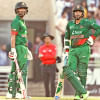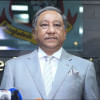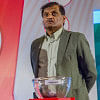Media recipient of BCB’s latest deflection!

The Bangladesh Cricket Board's (BCB) media committee chairman Tanvir Islam Tito yesterday seemed to have fortified the board's apparent confusion in identifying elements causing the national team's World Cup fiasco with a baffling statement pointing at the media.
Tito's assertions said that the media should also shoulder blame for the ruckus that Bangladesh skipper Shakib Al Hasan and former captain Tamim Iqbal created through interviews that stormed Bangladesh's build-up to the World Cup.
"The media also have to take responsibility for their role in this. I always believe that we and the media are on the same side. Just as we are responsible for working to develop cricket, you also have a responsibility to provide support," Tito told the reporters at the Sher-e-Bangla National Stadium yesterday.
"We are all here because of cricket. If cricket doesn't survive, we also wouldn't be here. So that's why, maybe it would've been better if such questions were not brought up at the time," he added.
As a plan of action in an effort to paper the cracks after the catastrophic campaign, BCB's disciplinary committee has been assigned to submit a report, supposed to determine the plan of action, if any, against Shakib and Tamim's interviews.
BCB has always highlighted that centrally contracted players must abide by the board's code of conduct manual which has guidelines on how players will interact with the media.
When asked if Shakib and Tamim had given such interviews in line with the code of conduct, Tito alleged that perhaps the interviews left adverse effects on the team. He also struggled to ascertain the deadline for the disciplinary committee to submit their report.
"Shakib, Tamim, Mushfiqur [Rahim], [Mahmudullah] Riyad are all senior cricketers. They are well aware of their contracts. If they [Shakib and Tamim] hadn't given such interviews right before the World Cup, we wouldn't have been in such an awkward position. It probably would've been better for the team," he said.
There have been calls for an autopsy of Bangladesh's World Cup debacle. The calm following the team's arrival, however, reflects the board's lack of urgency and perhaps unwillingness to actively pursue the identification of the potential reasons for the failure and then a plan for a course of action going forward.
Moreover, BCB's response has been nothing but ordinary despite such an appalling campaign. The board just decided to stick to the norm of getting reports from head coach Chandika Hathurusingha and team director Khaled Mahmud Sujon -- both of whom are parties in the disastrous tournament.
How much those reports would help in unearthing the real causes behind the failure remains a question, especially considering team director Mahmud had talked about his lack of involvement in the team's managerial decisions in India.
Expecting the BCB to act like a professional entity might be a bit stretching as it only recently learned that its women cricketers had not been receiving payments for five months due to a 'technical reason'
"Since everyone was busy playing in series, tournaments, and camps, no one felt the financial difficulty nor did anyone inform me about it. I got to know four to five days back," was all that chairman of BCB Women's Wing Shafiul Alam Chowdhury Nadel had to say in his defense.
Events such as these manage to puncture through BCB's boastful show of its bureaucracies. Time and time again, its lack of administrative structure has been laid bare, and usually, the explanations given rarely cease to baffle.

 For all latest news, follow The Daily Star's Google News channel.
For all latest news, follow The Daily Star's Google News channel. 








Comments